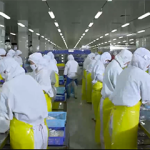US commercial fishermen take their aquaculture concerns to Capitol Hill
Commercial fishermen and their supporters let Congress know where they stand on a bill that would grant NOAA Fisheries the ability to regulate aquaculture operations in federal waters.
The letter, signed by 100 fishermen and supporters and sent to elected officials last week, claims each fish farm in the exclusive enterprise zone would restrict access to “hundreds of acres of marine space” to commercial fishermen. They also believe fish farms would produce lower-cost and lower-quality fish, which they believe would deter consumers from paying more for wild fish. Further, the letter raises concerns about the impact that farmed fish escapes and pollution stemming from fish feed and antibiotics might have on fishing stocks.
“Simply put, industrial seafood farms threaten the integrity of the wild fish populations that are key to our industry’s success, and the coastal communities we support,” the letter states.
In July, U.S. Sen. Roger Wicker (R-Mississippi) filed the Advancing the Quality and Understanding of American Aquaculture (AQUAA) Act to give NOAA Fisheries power to permit aquaculture activities within the country’s exclusive enterprise zone. In September, U.S. Reps. Steven Palazzo (R-Mississippi) and Collin Peterson (D-Minnesota) introduced a companion bill in the House.
With the current congressional term about to expire, those bills will need to be refiled when the new Congress convenes next month.
Noah Oppenheim, executive director for the Institute for Fisheries Resources, was one of the signatories on the letter. In an interview with SeafoodSource, he said he sees the possibility for some aquaculture operations, such as ones for shellfish or closed systems, as able to coexist with commercial fishing. However, he said in-pen fish farms, where fish are caged but share water with wild fish, would harm commercial fisheries.
He spent time on Capitol Hill last week to share his concerns with lawmakers and their staffs.
“We need to take this opportunity to have a robust and thorough discussion about aquaculture in the U.S. exclusive enterprise zone,” Oppenheim said.
A representative of Stronger America Through Seafood, an industry group formed earlier this year to promote aquaculture in the United States, said there is room for both types of operations to peacefully coexist. However, since federal courts have ruled NOAA Fisheries currently doesn’t have the authority to manage aquaculture operations, developing aquaculture on a larger scale in the United States is extremely difficult, Margaret Henderson, the group’s campaign director, told SeafoodSource.
That means entrepreneurs have to either sit and wait or take their money – and the job potential that goes with it – overseas to develop their farms, she said.
John Dentler, president of the Washington Fish Growers Association, said aquaculture can safely become a larger part of the U.S. economy. Commercial fishermen in Alaska are already relying on hatcheries to produce the salmon they fish in the wild, and the technology is available to sterilize farm-raised fish to prevent any escapees from mating with wild stocks, he said. In addition, lower income families should be able to purchase affordable, quality seafood products.
“Clearly, the public wants healthy seafood and we all want healthy, vibrant ecosystems,” he said. “Working together, we can do this.”






Share